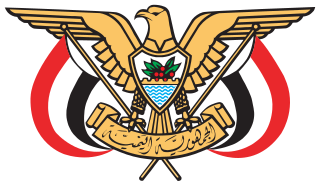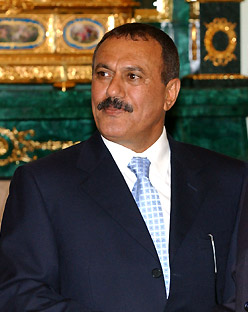 |
|---|
| This article is part of a series on the politics and government of Yemen |
|
Executive |
Legislature
|
| Judiciary |
Yemen is a one party dominant state in which the General People's Congress (GPC) holds power.
 |
|---|
| This article is part of a series on the politics and government of Yemen |
|
Executive |
Legislature
|
| Judiciary |
Yemen is a one party dominant state in which the General People's Congress (GPC) holds power.
Yemen's Political Parties Law mandates that political parties be viable national organizations comprising at least 75 founders and 2,500 members and not restrict membership to a particular region. [1] The government provides financial support to political parties, including a stipend for newspaper publication. [1]
The GPC captured 238 of 301 seats in parliament in the 2003 elections. [1] In the September 2006 elections for local and governorate councils, the GPC garnered 315 seats in the governorates (74 percent of the popular vote) and 5,078 local council seats (74 percent of the popular vote). [1] In the September 2006 presidential election, the JMP backed opposition candidate Faisal bin Shamlan, whose success in garnering 22 percent of the popular vote was viewed at the time as a first step in challenging the political stronghold of President Saleh and the GPC. [1] However, disputes between the GPC and the JMP in 2007 over election law amendments, coupled with the JMP’s opposition to President Saleh’s proposed democratic reform measures, have halted initial attempts to forge a dialogue between the two parties. [1]

The Politics of Yemen are in an uncertain state due to the Houthi takeover in Yemen. An armed group known as the Houthis or Ansar Allah seized control of the Northern Yemeni government and announced it would dissolve parliament, as well as install a "presidential council", "transitional national council", and "supreme revolutionary council" to govern the country for an interim period. However, the deposed president, Abdrabbuh Mansur Hadi, has declared he is still in office and is working to establish a rival government in Aden.

Ali Abdullah Saleh was a Yemeni politician who served as the first President of Yemen, from Yemeni unification on 22 May 1990 to his resignation on 25 February 2012, following the Yemeni Revolution. Previously, he had served as President of the Yemen Arab Republic, or North Yemen, from July 1978 to 22 May 1990, after the assassination of President Ahmad al-Ghashmi.

Elections in Yemen take place within the framework of a presidential system, with both the President and House of Representatives elected by the public. Due to political instability, elections have not been held regularly since the early 2000s.

The Arab Socialist Union Party of Syria (ASU) is a Nasserist political party in Syria. ASU is led by Safwan al-Qudsi. The party was formed in 1973, following a split from the original ASU.

The Arab Socialist Ba'ath Party – Yemen Region is the Yemeni regional branch of the Arab Socialist Ba'ath Party.

The Yemeni Socialist Party is a political party in Yemen. A successor of Yemen's National Liberation Front, it was the ruling party in South Yemen until Yemeni unification in 1990. Originally Marxist–Leninist, the party has gradually evolved into a democratic socialist opposition party in today's unified Yemen.
Faisal Othman Bin Shamlan was a Yemeni intellectual, technocrat, political reformist and public figure. He was a Yemeni member of parliament who had held the post of Oil and Mineral Resources Minister in the post-unification government of Yemen. Prior to the reunification of Yemen in 1990, Shamlan was the Minister of Infrastructure and Oil in the socialist government of South Yemen. He was the recognized presidential candidate of the Yemeni opposition coalition, a coalition which consists of the Islamist Islah, the Yemen Socialist Party and several smaller parties, in the 2006 presidential election, but was defeated by incumbent president Ali Abdullah Saleh.
Yemeni unification took place on May 22, 1990, when the area of the People's Democratic Republic of Yemen was united with the Yemen Arab Republic, forming the Republic of Yemen.

Presidential elections were held in Yemen on 20 September 2006, alongside local elections. Incumbent president Ali Abdullah Saleh of the General People's Congress received 77% of the vote, defeating opposition coalition candidate Faisal Bin Shamlan.
The modern history of Yemen began with the withdrawal of the Ottoman Empire. In 1839 the British set up a protective area around the southern port of Aden and in 1918 the northern Kingdom of Yemen gained independence from the Ottoman Empire. North Yemen became a republic in 1962, but it was not until 1967 that the British Empire withdrew from what became South Yemen. In 1970, the southern government adopted a communist governmental system. The two countries were formally united as the Republic of Yemen on May 22, 1990.

Direct presidential elections were held in Yemen for the first time on 23 September 1999. Candidates had to be approved by at least 10% of the 301 members of the House of Representatives; however, in practice this meant that only two parties, the ruling General People's Congress (GPC) and Al-Islah had enough seats to nominate their candidates. However, al-Islah backed the GPC candidate, incumbent President Ali Abdullah Saleh rather than running a candidate of their own.

The Yemeni Civil War was a civil war fought between the two Yemeni forces of the pro-union northern and the socialist separatist southern Yemeni states and their supporters. The war resulted in the defeat of the southern armed forces, the reunification of Yemen, and the flight into exile of many Yemeni Socialist Party (YSP) leaders and other separatists.

The Yemeni Revolution (intifada),or the Coffee Revolution, and also known as the Yemeni Revolution of Dignity followed the initial stages of the Tunisian Revolution and occurred simultaneously with the Egyptian Revolution of 2011 and other Arab Spring protests in the Middle East and North Africa. In its early phase, protests in Yemen were initially against unemployment, economic conditions and corruption, as well as against the government's proposals to modify Yemen's constitution. The protesters' demands then escalated to calls for the resignation of Yemeni President Ali Abdullah Saleh. Mass defections from the military, as well as from Saleh's government, effectively rendered much of the country outside of the government's control, and protesters vowed to defy its authority.

The Yemeni Congregation for Reform, frequently called al-Islah, is a Yemeni Islamist party founded in 1990 by Abdullah ibn Husayn al-Ahmar, Ali Mohsen al-Ahmar, Abdul Majeed al-Zindani, Mohammed al-Yadumi and Yahya Rassam. The first article of Islah basic law defines it as "a popular political organization that seeks reform of all aspects of life on the basis of Islamic principles and teachings".
Mohammed al-Sabry is a Yemeni politician and an opposition leader for the Common Forum coalition of opposition parties in the 2011 Yemeni protests. He has also been described as a spokesman for the opposition coalition known as the Joint Meeting Parties (JMP), which includes Islah, the country's largest Islamic party, as well as the Socialist Party and the Nasserite Party.
Hamid al-Ahmar is a Yemeni politician currently living in exile after fleeing Yemen during the Houthi takeover of Sana'a September 2014. He is the former general secretary of the Preparatory Committee of the National Dialogue for the JMP and a member of opposition party Yemeni Congregation for Reform, commonly known as Islah.

The Arab Socialist Ba'ath Party, also referred to as the pro-Iraqi Ba'ath movement, is a Ba'athist political party which was headquartered in Baghdad, Iraq until 2003. It is one of two parties which emerged from the 1966 split of the original Ba'ath Party.

The National Arab Socialist Ba'ath Party – Yemen Region is a political party in Yemen. The party is the Yemeni regional organisation of the Iraq-led Ba'ath Party. The secretary of the party in Yemen is Dr. Qassem Salam Said. Abdulwahid Hawash serves as the deputy secretary. The party publishes the newspaper Al-Ehyaa Al-'Arabi.

The following is a timeline of the 2011–2012 Yemeni revolution from 3 June through 22 September 2011. The Yemeni revolution was a series of major protests, political tensions, and armed clashes taking place in Yemen, which began in January 2011 and were influenced by concurrent protests in the region. Hundreds of protesters, members of armed groups, army soldiers and security personnel were killed, and many more injured, in the largest protests to take place in the South Arabian country for decades.
The Arab Nationalist Movement, also known as the Movement of Arab Nationalists and the Harakiyyin, was a pan-Arab nationalist organization influential in much of the Arab world, particularly within the Palestinian movement. It was established in 1952 by George Habash.